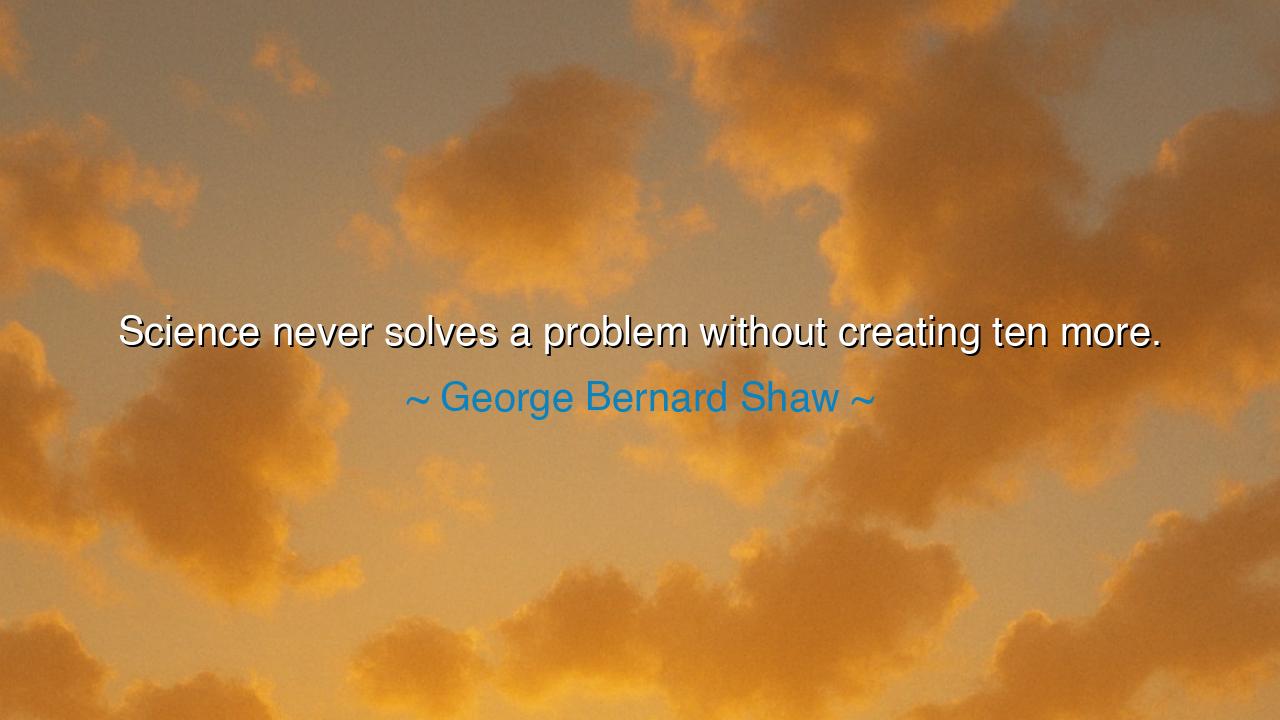
Science never solves a problem without creating ten more.






"Science never solves a problem without creating ten more." These words by George Bernard Shaw echo a profound truth about the nature of discovery and knowledge. Shaw, the great dramatist, was keenly aware of the paradox that comes with human progress. Every scientific breakthrough or innovation carries with it a ripple effect—each answer often leads to a cascade of new questions. Science, in its unyielding pursuit of truth, continuously opens doors to deeper mysteries, and with each step forward, it invites the mind to grapple with even more complexities. It is the relentless nature of inquiry that ensures no solution is ever truly final, for it is followed by an endless series of new challenges and unanswered questions.
In the ancient world, the search for truth was also seen as a journey, not a destination. The Greeks, particularly Plato and Aristotle, believed that knowledge was an eternal pursuit, never truly complete. Plato described the philosopher’s task as the search for the ideal forms, understanding that every discovery only pointed toward deeper understandings yet to be had. Aristotle too sought to explain the workings of the natural world, but even he knew that the pursuit of knowledge would never reach an end. The act of learning, of seeking understanding, would always uncover more layers of complexity. Shaw’s insight into science is rooted in this ancient understanding: that every answer brings forth a new question, a new challenge to be solved.
Consider the example of Isaac Newton, whose discovery of the laws of motion and gravity fundamentally changed our understanding of the universe. Newton’s work solved many of the questions about how celestial bodies moved, and yet, his answers led to a whole new set of problems. His law of gravitation explained how planets orbit the sun, but it also led to questions about the nature of space, time, and the structure of the universe. Newton’s discoveries were groundbreaking, but they opened the door to more complex theories—leading to Einstein’s theory of relativity and, eventually, the search for quantum mechanics. Each new theory did not simply solve the previous questions; it raised a new set of inquiries. The pursuit of knowledge, as Newton’s own life showed, never comes without the responsibility to address the new challenges it creates.
In the modern world, the discovery of the atom by J.J. Thomson and the subsequent work on nuclear physics is a perfect illustration of Shaw’s insight. The atom, once thought to be indivisible, was split, and with its division came not only new understanding but also a host of new problems—moral, philosophical, and scientific. The development of atomic weapons during World War II posed a moral dilemma that science itself could not solve. The advancement of nuclear energy, while offering great potential for power generation, also opened the door to concerns about radiation, waste management, and the environmental impact of such technologies. As Shaw observed, the very act of solving one problem gave rise to many others, each requiring its own examination and solution.
This endless cycle of discovery and problem creation is not a sign of failure or stagnation, but rather of the inexhaustible nature of knowledge. Science, in its pursuit of truth, is not simply an act of solving problems, but a journey that invites more questions, more exploration, and more understanding. Consider the recent advances in artificial intelligence and genetic engineering. While these fields promise remarkable potential, they also present new dilemmas in terms of ethics, privacy, and the very definition of life. With each breakthrough in technology, new questions emerge that challenge our moral compass, our understanding of what is natural, and how we define what it means to be human. The act of solving problems in science is always accompanied by the creation of new avenues for inquiry, and Shaw’s words speak to this dynamic relationship between discovery and uncertainty.
Shaw’s words also offer a powerful lesson in humility. It reminds us that knowledge—whether scientific, philosophical, or practical—is never complete. The more we know, the more we come to realize how much remains unknown. In our own lives, when we encounter problems and find solutions, it is wise to remember that these solutions will often give rise to new challenges. Life itself is an ongoing journey of questioning and seeking, where the answers we find only lead us to more paths of discovery. To approach life with the understanding that each solution creates new challenges is to embrace the eternal nature of growth, and to find satisfaction not just in the answers, but in the process of inquiry itself.
In your own life, consider how you approach the problems you face. Do you see each challenge as a singular task to be solved, or do you recognize that with every solution, new opportunities for growth and learning are born? Like scientists, we must embrace the cycle of problem-solving with openness, knowing that each answer we find may only bring more questions to light. Rather than fearing the new problems that emerge, we should welcome them as opportunities for deeper understanding and further exploration. Just as the greatest thinkers in history have discovered, it is in the journey of solving problems—rather than in the final answers—that the true value of knowledge lies.






AAdministratorAdministrator
Welcome, honored guests. Please leave a comment, we will respond soon